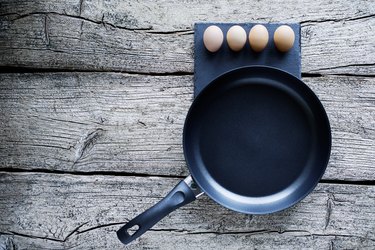
Anodized aluminum cookware is durable and easy to use. Properly seasoning the anodized cookware offers better results when cooking with the treated pots and pans.
What is Anodized Cookware
Video of the Day
The process of creating hard anodized aluminum prevents the metal from reacting with acidic foods. The material has been anodized when it has been subjected to an electrolytic process where the natural oxidation of the metal has been controlled.
Video of the Day
When higher voltage and lower temperatures have been applied to the metal, it is called hard anodized. This is a more durable version and has an even harder cookware coating.
Anodized cookware has a hard, smooth surface that can stand up to all a home chef can throw at it. It's less expensive and conducts heat very well.
Why Seasoning Cookware is Beneficial
The purpose of seasoning cookware is to seal the surface. Without this precious layer of season, the material would otherwise corrode. Acidic foods, sauces and cleaning agents would ravage the surface of the unseasoned cookware surface.
The aluminum cookware is more than just one material; it is aluminum oxide. The aluminum surface becomes oxidized when it is placed in an electro-chemical bath. This create a surface that is harder than stainless steel and more difficult to scratch.
Advantages and Disadvantages of Anodized Cookware
The seasoned surface of an already anodized pan provides an even better cooking surface, as well as a more durable pan. Metal, wood or hard plastic utensils shouldn't scratch the surface of the pan.
The anodized pan isn't completely nonstick after seasoning, so don't take it for granted when creating elaborate dishes.
Anodized cookware makes great sauce pans and omelet pans because food should slide right off of the seasoned surface.
To Season Anodized Aluminum Pan
New cookware should be washed clean with a mild dish soap to remove any dust or filmy residue left behind from the factory and packing materials. Rinse and dry your pan thoroughly before placing them over high heat. Pour enough of a neutral oil, such as vegetable or olive, into the bottom of the pans to lightly coat the surface.
Use a sponge to ensure the oil reaches all areas of the bottom of the pan. When the oil begins to smoke, remove it from the heat and let it cool down completely. Once it's cool enough to touch, wipe off any excess oil and hand wash the pan with warm water.
Maintaining a Seasoned Pan
If you have washed the anodized cookware with soap, then you can restore the hard anodized cookware interior with another round of seasoning. Commercial aluminum cookware cleaning solutions can be used to keep the seasoned surface pristine.
Using the dishwasher isn't a good idea, unless you don't mind re-seasoning after each trip through the appliance. The high heat of the dishwasher can strip the carefully created layer of seasoning. The anodized pan should be hand washed after use to keep the pan's seasoned surface in good shape.
Only use water and a good sponge to scrub out any bits of food or slicks of sauce that have stuck to the surface. Don't use soap unless absolutely necessary. If you need to use soap, then the pan will need to be re-seasoned after each bout with cleaners, whether they are commercial or homemade.